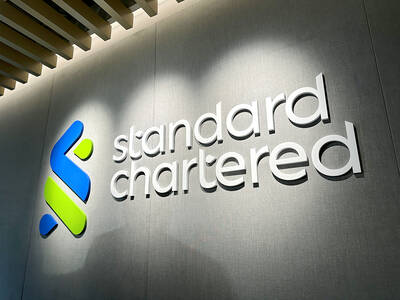The nation’s exports of electric bicycles surpassed those of traditional bikes in the first five months of this year, with the export value of the former hitting a new high for the period, the Ministry of Finance has said.
Electric bike exports totaled US$550 million in the January-to-May period, up 44.2 percent from a year earlier, compared with US$530 million generated by traditional bicycle producers, up 38 percent annually, data compiled by the ministry showed.
Rising tensions between the US and China prompted foreign buyers of electric bikes to shift their orders to Taiwan, while growing awareness of environmental issues also boosted shipments, the ministry said.

Photo: CNA
Electric bicycles emerged as a new growth driver in the nation’s vehicle and component exports in the first five months, when the export value hit US$5.32 billion, up 41.2 percent from a year earlier, it said.
The slower growth in traditional bikes reflected a fall in international demand as the global economy was hit by the COVID-19 pandemic and there was an increase in bike-sharing worldwide, the ministry added.
The US was the largest buyer of Taiwanese electric bicycles, accounting for 39.3 percent of total outbound sales in the first five months, while Europe was the top foreign buyer of traditional bikes, making up 67 percent of the total.
Data on vehicle and part exports from Taiwan cover passenger vehicles and components as well as bicycles and bicycle parts, according to the ministry.
In the five-month period, bike component exports totaled US$1.74 billion, up 65.2 percent from a year earlier, with Europe the largest buyer, accounting for 53.6 percent of total sales, ahead of the US (14 percent) and ASEAN (12 percent), the ministry said.
Bicycle components accounted for a greater share of vehicle and component sales during the period, making up 32.8 percent of total sales, compared with 30.7 percent last year, it said.
Passenger car exports totaled US$400 million in the first five months, up 47.7 percent from a year earlier, the ministry said, citing the effects of reopening economies around the world.
The Middle East was the largest buyer of passenger cars, with purchases accounting for 43.3 percent of the total in the five-month period, but the growth moderated from more than 80 percent in the past few years, a reflection of the region’s weaker economy, the ministry said.
The US was the second-largest buyer of Taiwan’s passenger cars during the period, making up 17.2 percent on the back of strong demand for all-terrain vehicles, ahead of Europe (14.8 percent), and China and Hong Kong (14.4 percent), it said.

South Korea’s equity benchmark yesterday crossed a new milestone just a month after surpassing the once-unthinkable 5,000 mark as surging global memory demand powers the country’s biggest chipmakers. The KOSPI advanced as much as 2.6 percent to a record 6,123, with Samsung Electronics Co and SK Hynix Inc each gaining more than 2 percent. With the benchmark now up 45 percent this year, South Korea’s stock market capitalization has also moved past France’s, following last month’s overtaking of Germany’s. Long overlooked by foreign funds, despite being undervalued, South Korean stocks have now emerged as clear winners in the global market. The so-called “artificial intelligence

Chinese artificial intelligence (AI) start-up DeepSeek’s (深度求索) latest AI model, set to be released as soon as next week, was trained on Nvidia Corp’s most advanced AI chip, the Blackwell, a senior official of US President Donald Trump’s administration said on Monday, in what could represent a violation of US export controls. The US believes DeepSeek will remove the technical indicators that might reveal its use of American AI chips, the official said, adding that the Blackwells are likely clustered at its data center in Inner Mongolia, an autonomous region of China. The person declined to say how the US government received

FORTUNES REVERSED: The new 15 percent levies left countries with a 10 percent tariff worse off and stripped away the advantage of those with a 15 percent rate In a swift reversal of fortunes, countries that had been hardest hit by US President Donald Trump’s tariffs have emerged as the biggest winners from the US Supreme Court’s decision to strike down his emergency levies. China, India and Brazil are among those now seeing lower tariff rates for shipments to the US after the court ruled Trump’s use of the International Emergency Economic Powers Act to impose duties was illegal. While Trump subsequently announced plans for a 15 percent global rate, Bloomberg Economics said that would mean an average effective tariff rate of about 12 percent — the lowest since

Standard Chartered Bank Taiwan’s newly appointed chief executive officer, Anthony Yu (游天立), yesterday unveiled an ambitious growth strategy for the bank’s wealth management division, reflecting a bullish outlook on Taiwan’s high-net-worth market. Yu, the first local executive to lead Standard Chartered Bank’s Taiwan operations, emphasized rising client demand and detailed plans to expand the bank’s digital capabilities, as well as its physical presence across the country. Standard Chartered Taiwan saw a remarkable surge in new wealth management clients last month, with the number of clients holding assets equivalent to US$1 million more than doubling compared with the same month last year, he